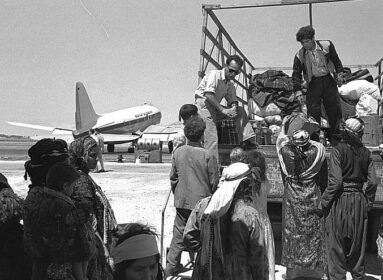By Judie Jacobson –
In his debut novel, award winning broadcast journalist Martin Fletcher has crafted a moving story, culled in part from the painful history of his own family’s past in Europe during and after World War II. Set amidst explosive events in London and Palestine in the years directly following the war, “The List” follows the lives of Edith and Georg, Austrian refugees who are expecting their first baby in a world unfriendly to Jews. As anti-Semitism sweeps across the streets of London, even as the world learns of the atrocities of the Holocaust, the couple desperately searches for surviving family members, struggling to stay afloat in a world riddled with terrorism, assassination attempts, and fear.
Fletcher will discuss his new book at the Stamford Jewish Community Center on Wednesday, Nov. 9 at 7 p.m.
Born in London, Fletcher was the NBC Middle East correspondent and Tel Aviv Bureau Chief for more than three decades. He began his career as a television news writer for Britain’s VisNews in 1970. He joined the BBC as a news writer, returning to VisNews after learning to be a news cameraman. After four years in Belgium, Israel and Rhodesia, he joined NBC News as a cameraman in 1977. He moved over to his Tel Aviv assignment in 1982 and became bureau chief in 1996.
Among his many awards, Fletcher has won five Emmy Awards, for his work on the first and then second Palestinian uprisings, the horrors of war in Rwanda and Kosovo, and for his story on trauma medicine in Israel. He is also the author of two non-fiction books, “Breaking News” and “Walking Israel,” for which he won a Jewish National Book Award. Today, he serves an NBC News Special Correspondent.
Fletcher and his wife and family live in Israel and New York City.
The Ledger spoke with Martin Fletcher recently about his experience as a foreign correspondent in Israel.
What made you try your hand at writing a novel?
A: It was always my dream. I always wanted to write fiction. When I started to write fiction I realized I couldn’t’ do both. I couldn’t have a full-time job and write fiction. So I resigned. Though I’m actually working at NBC right now. I left my job [as NBC’s Tel Aviv bureau chief], but I’m still working as a special correspondent on all kinds of different assignments and I’m also teaching a writing course.
Why did you choose the Holocaust as a subject for your novel? Is there a family history?
A: I do have a family history. But it’s important for me to point out that it’s not about the Holocaust; it’s a post-Holocaust novel. I wanted to write about the rebuilding process after the Holocaust. It’s very much based on my parents’ experience, but not on their story, because I don’t know their story. They didn’t tell me and had died before I had the idea. My family is from Austria; my mother and my father had only one relative on each side who survived; everyone else died in the camps. My parents were not in the camps, they left in early 1939. They were able to get away and they came to London as refugees. So, the story of the book is about Jewish refugees immediately after the war. It’s a love story really, among the wreckage of the Holocaust.
And it also involves Palestine?
A: When I began to research the novel I had a very specific idea: a young Austrian refugee couple have a baby in London in 1945, during the last three months of the pregnancy they’re beginning to find out what happened to their family in the Holocaust. So, there’s an emotional roller coaster going on – a conflict of emotions. But then, when I did the research, I read all the local newspapers from London during that period in 1945 and I found out two things: there was a petition to throw the Jewish refugees out of England in October 1945. I found that amazing. I’ve never seen that written in any history books at all, but I read it in the local newspapers; the headline, for instance, on Oct. 12, 1945 of the Hampstead Highgate Express, which is where the story is based, was “Eject the Aliens.” I didn’t know that until I was researching it, but I had the idea of the couple and then this added an aspect to it. One of the reasons for the support for the petition against the Jews in London was that the fight was beginning in Palestine between the Jews and the British, who controlled Palestine and were limiting Jewish immigration. The British were afraid that the Jews would export terrorism from Palestine to London; and the Jews all said that will never happen. But then the British secret service, MI5, released their secret files in 2006, which said there was indeed a plot by Jewish terrorists from Palestine to assassinate the British foreign minister in London. Again, that fell into my story – it’s exactly the same time frame. This was all happening while my [fictional] family was going through their experience. So, I obviously wanted to include all that.
Did your own experience in Israel influence your writing about Palestine?
A: It probably gave me a great understanding of the significance of it, because I understood that if they came within 24 hours of killing the foreign minister, Ernest Bevin – I mean they nearly did it; they received a cable that read “do not do the fat man” the night before they were to assassinate Bevin. The actual plot to assassinate Bevin was in 1946, but I moved it up into the last three months of 1945. Near the end of my book I explain the time frame, telescoping the time for the purposes of the novel.
I am sure that if they had killed the British foreign minister at that time there would be no Israel today, because there was no way the British could have supported a Jewish state in Palestine one year after Jews assassinated the Jewish foreign minister in London…500 meters from Buckingham Palace. Of course, if Britain wouldn’t have supported a Jewish state in Palestine, a few other members of the Commonwealth wouldn’t have supported it, and maybe member states in Europe would either have supported Britain or abstained. There is just no way there would be an Israel today if they had succeeded with this plot. It’s an amazing story…and no one even knew about it until MI5 released its files.
Did you ask to be assigned to Israel in the early days of your career as a journalist?
A: No. I was sent there. Actually my first assignment in Israel was with VisNews as a cameraman, from ’73 to ’75. That’s when I met my wife; she’s Israeli. She was a soldier and she was hitching and I picked her up. I arrived a week before the war, knowing nothing about anything, and then suddenly one week later I was told to go to the Golan Heights. I didn’t even know where the Golan Heights was. I said “why?” They said “There’s a war on.” I said “Are you nuts? why would I want to go there then?”
During the time you were working as a journalist in Israel, do you think there was ever a specific moment when the opportunity for peace was there, but for whatever reason slipped through Israel’s fingers?
A: Not really. There were a couple of real chances for an agreement, but I no longer believe that there can be a peace agreement. I was a real left winger, but my last book, “Walking Israel,” changed my mind. Until then I believed that if there were close relations and economic development and, ultimately, mutual interest in stability, that would lead to peace. Now, after the research I did for that book – even though I lived there for 25/30 years before I did this research – I eventually understood that actually no Arabs want Israel to exist. Every Arab I spoke with said the same thing: one day something will happen and Israel won’t be here. Even those who were my Arab friends, whom I know are great citizens and would never do anything to harm the country, they all say “Well, one day Israel will go.” I didn’t know they felt that way. It surprised me.
You say you were left wing – did that change you?
A: Well, I wouldn’t say I was really left wing, but I was a wishy-washy liberal kind of guy. I’m a liberal on social issues and a bit hawkish on security issues. Actually, I guess I wouldn’t use the words left wing or hawkish. I would say that after all my experience there, I know these people. I spent a lot of time with Palestinians and with the Al Aqsa Martyr’s Brigade and I know that even in the worst of the fighting when they were sending suicide bombers to Israel they felt they were forced into it and would have much preferred to live a peaceful life. So, I don’t want to be a hawk. It’s just not that simple. Those labels don’t work. But I understand that they will never want to live in peace with Israel. Hopefully, something will change – but I don’t believe it will change.
There is some speculation that at least part of the reason for the Shalit deal – on both sides, both Hamas and Israel – is to marginalize Abbas. Do you think that may be true?
A: I don’t know. I’ve been on the road and really haven’t spoken to too many people there in the last couple of weeks. I’ve read that it may be some sort of punishment to Abbas, etc. But I doubt that very much. I doubt that such a gigantic step, releasing 1,027 people, can be balanced against sticking a spoke in the wheels of Abbas. I don’t know, but I don’t personally believe that. A lot of things probably went into it.
One Israeli journalist said something interesting. That of all the journalists who’ve been writing against the deal, not one woman journalist in Israel has done so – and probably more than half the journalists in Israel are women. Last night I was speaking somewhere about it and someone said to me “As a mother, I feel…” So, the minute someone utters that phrase there’s no argument. What can you say? “So, that’s part of what happens in Israel: Mothers gang together and push the country toward this emotional-based decision.
Well, after all, it is a Jewish state.
A: That’s right. Of course, there’s a huge debate going on in Israel whether it was the right move or the wrong move, but the bottom line is that no other country would do this. What a wonderful thing to be a Jew!
What’s your overall impression of Prime Minister Netanyahu?
A: I know the guy – not very well, but I know him. And you know he’s very charming and all the rest of it. But Israel needs a leader who will make the tough decisions – Israel needs an Arik Sharon – a man I had always hated but grew to admire, even if I didn’t agree with half the stuff he said. But he’s a leader and that’s what Israel needs. Bibi is just not a leader.
Any other prime ministers, besides Sharon, that you would describe as leaders?
A: Rabin was a leader, even though he was a kind of reluctant leader. He made decisions. Begin was definitely a leader. I admire Begin. Another guy I didn’t agree with, but ultimately I admired. He had an extraordinary history and his books were fantastic. I agree with the most right wing figures in terms of Israel – although, as I say labels don’t apply in Israel; “left wing” and “right wing” are irrelevant in the Israeli context. It’s just so complicated. But while I always found myself agreeing with the right wing arguments, I totally disagreed with their conclusions. I thought they raised the right questions and described the issues accurately. But then when they said well here’s what you’ve got to do about it, I never agreed with their conclusions.
Martin Fletcher will speak on Wednesday, Nov. 9, 7 p.m. at the Stamford JCC, 1035 Newfield Ave. For information call (203) 322-7900 or visit wwwstamfordjcc.org.








 Southern New England Jewish Ledger
Southern New England Jewish Ledger












